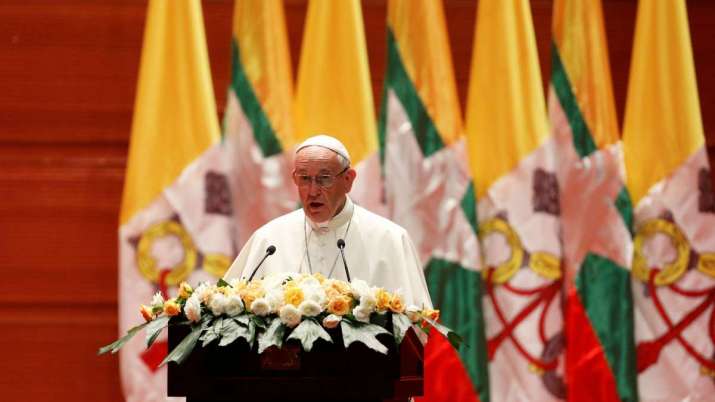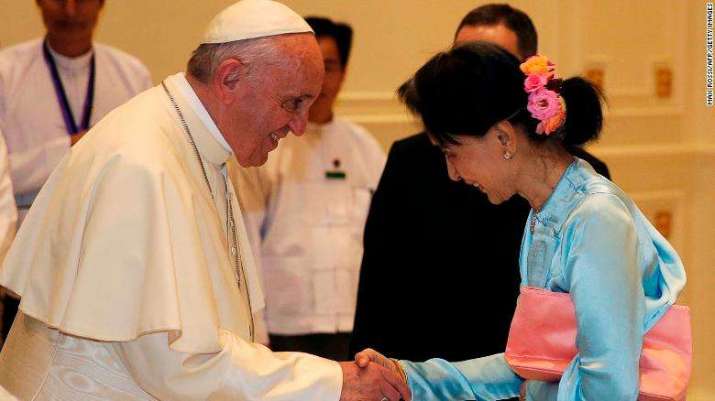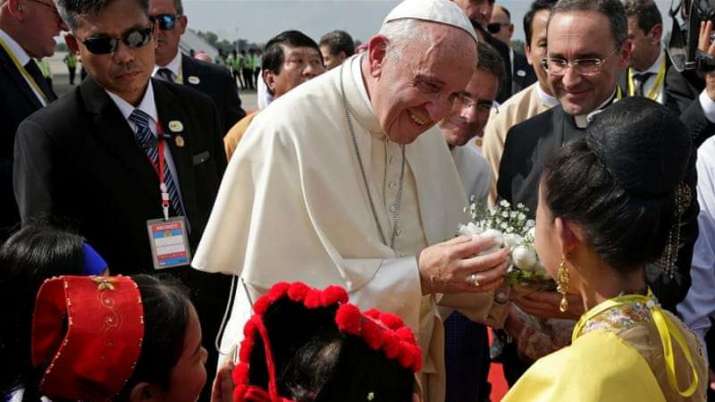NEWS
Pope Francis Calls for Human Rights, Justice, and Respect in Myanmar, Avoids the Term “Rohingya”
 Pope Francis during his speech at Naypyidaw From qz.com
Pope Francis during his speech at Naypyidaw From qz.comPope Francis urged Myanmar’s leaders to dedicate themselves to human rights, justice, and respect for “each ethnic group and its identity” in a much anticipated address in Myanmar on Tuesday, although he avoided explicity using the term “Rohingya.”
The pontiff arrived in Yangon on Monday for a much anticipated and densely packed four-day visit to Myanmar. Since arriving, the octogenarian has met with Min Aung Hlaing, the commander-in-chief of Myanmar’s army, who continues to have a major influence in the country despite the fall of the military regime, Nobel Peace Prize laureate and Myanmar’s de facto civilian leader, Aung San Suu Kyi, and President Htin Kyaw.
As a leading voice for the plight of refugees throughout the world, Pope Francis was expected to speak out in behalf of the Rohingya, as he has done in public appeals earlier this year when he spoke of the “persecution” of “our Rohingya brothers,” but during Tuesday’s speech for Myanmar officials in the capital Naypyidaw, the religious leader avoided the term “Rohingya” after being cautioned by his advisors that it could lead to a diplomatic incident.
Before the trip, the pope’s advisors, including Cardinal Charles Maung Bo of Myanmar, had advised him that using the laden term in Myanmar might risk turning the country’s military and government against the the local Christian community. A hardline group of Buddhist nationalists had also warned that there would be a “response” if the pope addressed the Rohingya issue directly.
 Pope Francis shakes hands with Aung San Suu Kyi at Naypyidaw on Tuesday. From cnn.com
Pope Francis shakes hands with Aung San Suu Kyi at Naypyidaw on Tuesday. From cnn.com“The future of Myanmar must be peace, a peace based on respect for the dignity and rights of each member of society, respect for each ethnic group and its identity, respect for the rule of law, and respect for a democratic order that enables each individual and every group—none excluded—to offer its legitimate contribution to the common good,” the pope said in his address. (Reuters)
In his speech—which Richard Horsey, a former United National analyst based in Yangon, noted was “crafted to avoid antagonizing local audiences”—the 80-year old pontiff also addressed how Myanmar needed to heal its wounds after nearly 50 years of military rule, calling for a “just, reconciled, and inclusive social order,” and adding that “the arduous process of peacebuilding and national reconciliation can only advance through a commitment to justice and respect for human rights.” (Reuters)
Referring to the different religious and ethic groups in the country, Pope Francis emphasized how these differences “need not be a source of division and distrust, but rather a force for unity, forgiveness, tolerance, and wise nation-building.” In a previous meeting with representatives of the Buddhist, Christian, Hindu, Islamic, and Jewish faiths in Yangon, he stressed the same, calling for “unity in diversity.” (Reuters)
After Myanmar, Pope Francis will move on to neighboring Bangladesh, which is the temporary home for more than 600,000 Rohingya refugees who have fled the violence in Myanmar.
 Pope Francis receives flowers after landing in Yangon. From aljazeera.com
Pope Francis receives flowers after landing in Yangon. From aljazeera.comReligious tensions between Buddhists and Muslims in Myanmar have simmered for almost half a century. Myanmar’s government classifies Rohingya Muslims as stateless foreign migrants, even though many communities have lived in Myanmar for generations.
According to the Washington, DC-based Pew Research Center, Buddhists make up more than 80 per cent of Myanmar’s population of some 52 million, Christians 7.8 per cent, and Muslims just 4 per cent, which includes Muslims from other ethnic groups. Rakhine State—where Rohingya Muslims make up the majority in the north and Buddhists the majority in the south—has been the epicenter of the unrest.
The tensions in the region led to the latest outbreak of violence on 25 August, when a group of Muslim insurgents—known as the Arakan Rohingya Salvation Army—attacked police posts in Rakhine. According to media reports, an estimated 624,000 Rohingya have fled military clearance operations and attacks by Buddhist mobs in Rakhine, seeking temporary refuge in neighboring Bangladesh in what the United Nations has described as the “world’s fastest growing refugee crisis.”
Refugees have reported deliberate attacks against civilians, including children, which the United Nations called a “textbook example” of ethnic cleansing against the Rohingya. Buddhist nationalist have fuelled tensions between Buddhists and Muslims in Myanmar, giving rise to fears among non-Rohingya Muslim groups, even though they hold citizenship rights.
In October, Myanmar and Bangladesh signed an agreement to start the repatriation of Rohingya who can prove they are Myanmar residents. Human rights advocates, however, are skeptical of the repatriation effort as many of the Rohingya do not have the required documentation to prove their citizenship, and stand to lose their farms and land, which are likely be forfeited to the government without the necessary proof. In addition, humanitarian workers have expressed concern about the current state of Myanmar, postulating that it is still unsafe for the Rohingya to return.
See more
Pope Francis Has Arrived in Myanmar Amid Simmering Tensions. Here's Why That Matters (Time)
Rohingya crisis unleashes fears among Myanmar's other Muslims (CNN)
Pope urges respect for human rights in Myanmar, avoids 'Rohingya' row (Reuters)
Pope meets Myanmar's military chief in shadow of Rohingya crisis (Reuters)
Pope Francis disappoints rights groups by failing to mention Rohingya in Myanmar speech (South China Morning Post)
Pope Francis holds historic Papal Mass in mainly Buddhist Myanmar (CNN)
Related news from Buddhistdoor Global
Myanmar Buddhists Protest Against Repatriation of Rohingya Refugees
American Buddhist Teachers Issue Letter to Myanmar Leadership Urging Peace
Bangladeshi Buddhists Call for Peaceful Solution to Rohingya Crisis
Dalai Lama Urges Aung San Suu Kyi to Solve Rohingya Crisis in Letter
Indonesia Bans Myanmar Protests at Borobudur Buddhist Temple
Thousands Flee as Violence Flares in Myanmar’s Rakhine State
Senior Malaysian Monk Condemns Anti-Muslim Violence in Myanmar
Sister Chan Khong Appeals for an End to Rohingya Oppression in Open Letter to Aung San Suu Kyi
Buddhist Aid Workers in Myanmar’s Troubled Rakhine State Risking Public Censure
Buddhist Hardliners Protest Annan’s Visit to Myanmar’s Troubled Rakhine State
Myanmar to Form Buddhist-Muslim Commission to Address Humanitarian Crisis in Rakhine State














